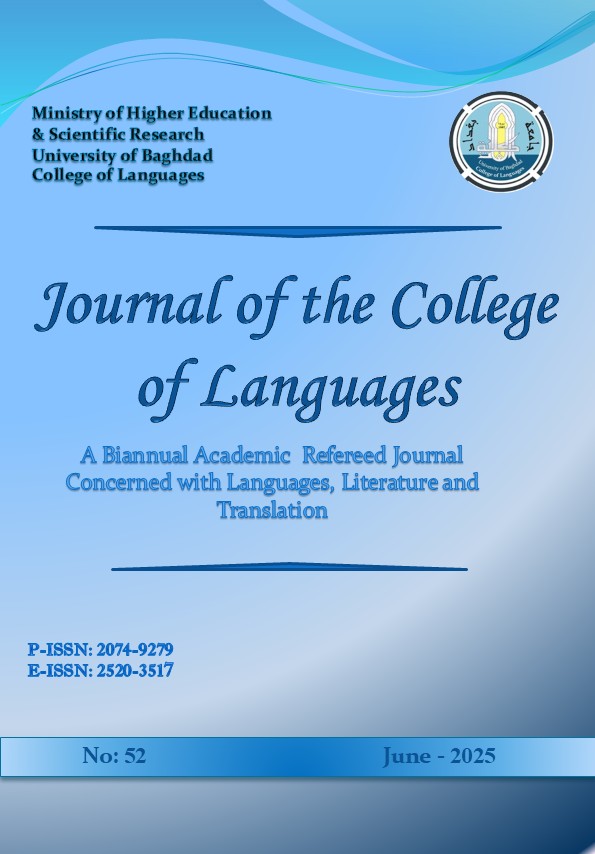A Socio-Pragmatic Discourse of the Re-Introduced Nigerian National Anthem, “Nigeria, We Hail Thee”
DOI:
https://doi.org/10.36586/jcl.2.2025.0.52.0023Keywords:
Illocutionary acts , National anthem, socio-pragmatics, speech acts, unityAbstract
The study conducted a pragmatic analysis of Nigeria's re-introduced national anthem, “Nigeria, We Hail Thee”, in order to examine the communicative functions of the anthem and the ways in which language was used to convey national identity, unity, and duty. Using a mixed-method approach through Searle’s Speech Act and Halliday’s Systemic Functional Linguistics theories, a qualitative line-by-line analysis was first performed, before categorizing the locutionary, illocutionary, and perlocutionary acts, which were analysed quantitatively. The study showed distinct speech acts, including admiring, asserting unity, and encouraging duty, asserting values, declaring, promising, committing, and praying. Statistical analysis of the frequency of illocutionary acts revealed that “praying” was the most frequent illocutionary act, appearing in two lines (25%), while other acts, such as “admiring” and “asserting unity,” occurred once each (12.5%). The study also examined the verbs used in the anthem, categorizing them into Austin's typology of exercitives, behavitives, and verdictives. The analysis found that behavitives, which relate to behaviour and social conduct, dominated the anthem (50%), followed by exercitives (37.5%) and verdictives (12.5%). The findings revealed that the anthem primarily utilised speech acts that promoted national unity, service, and respect for the country's values, with a significant focus on divine intervention and guidance.
References
Adebayo, A. A. (2018). The linguistics of national consciousness: An analysis of the Nigerian national anthem. Journal of Language and Linguistics, 1–18. https://www.google.com/url?sa=t&source=web&rct=j&opi=89978449&url=https://www.academia.edu/121092448/National_Anthem_And_National_Consciousness_In_Nigeria_A_Rebirth_Or_A_Relapse&ved=2ahUKEwismub9vaWMAxV4SkEAHYPXNYwQFnoECB8QAQ&usg=AOvVaw09TEE9aRFzQ6JEn-7tq6PP. Downloaded on 13/02/2025.
Ajayi, A. (2019). National identity and nation-building in post-colonial Nigeria. Ibadan: University of Ibadan Press.
Akinyele, R. (1996). States creation in Nigeria: The Willink report in retrospect. African Studies Review. 39(2). 71-94. https://doi.org/10.2307/525436
Anderson, B. (1983). Imagined communities: Reflections on the origin and spread of nationalism. Londres: Verso.
Austin, J. L. (1962). How to do things with words. Oxford: Oxford University Press.
Ayoade, J. A. A. (1998). The Federal Character Principle and the Search for National Integration. In K. Amuwo et al (Eds.), Federalism and Political Restructuring in Nigeria (pp. 101-120). Ibadan: Spectrum Books Limited.
Bell, A. (1984). Language style as audience design. Language in Society, 13(2), 145–204.
DOI: https://doi.org/10.1017/S004740450001037X
Daily Gazette. (2024, May 29). Tinubu signs bill returning old national anthem into law. Daily Gazette.
Falola, T. (2001). Nationalism and African intellectuals. New York: University of Rochester Press.
Falola, T., & Heaton, M. (2008). A history of Nigeria. Cambridge: Cambridge University Press.
Faniyan, J. A. (2012). National anthems as solemn patriotic songs: A historical perspective. Journal of African Studies, 10(4), 1–15.
Faniyan, O. (2012). The Nigerian national anthem: A stylistic approach. Ibadan: University of Ibadan Press.
Fayomi, O., Chidozie, F. and Ajayi, L. (2015) Nigeria’s National Image and Her Foreign Policy: An Exploratory ApproacFh. Open Journal of Political Science, 5, 180-196. doi: 10.4236/ojps.2015.53019.
Findlay, J. (2019, July 18). Largest ethnic groups in Nigeria. WorldAtlas. https://www.worldatlas.com
Giles, H., Coupland, N., & Coupland, J. (1991). Accommodation theory: Communication, context, and consequences. In H. Giles, J. Coupland, & N. Coupland (Eds.), Contexts of accommodation: Developments in applied sociolinguistics (pp. 1–68). Cambridge University Press.
Halliday, M. A. K. (1978). Language as Social Semiotic: The Social Interpretation of Language and Meaning. London: Edward Arnold.
Halliday, M. A. K. & Mathiessen, C.M.I.M (2004). An introduction to functional grammar. (3rd Edition). London: Edward Arnold
Majeed, R. M. (2022). A pragmatic analysis of illocutionary acts in a selected presidential speech on Covid-19. Journal of the College of Languages (JCL). (45). 84 – 107. doi: https://doi.org/10.36586/jcl.2.2022.0.45.0084
Mazrui, A. A. (1980). The African condition: A political diagnosis. London: Heinemann.
Media Nigeria. (2018). The evolution of Nigeria's national anthem. Retrieved from http://medianigeria.com/nigerias-national-anthem on 03/01/2025
Mohammed, Y., & Ayeni, A. (2018). The role of national anthems in postcolonial Nigeria. Ibadan: University of Ibadan Press.
Naija News. (2024, May 31). ‘It was a priority for me’ – Tinubu breaks silence on reintroduction of old national anthem. Naija News.
Nnoli, O. (1995). Ethnicity and development in Nigeria. United Kingdom: Avebury.
Odebode, I. (2020). A socio-pragmatic study of the Nigerian national anthem. International Journal of Linguistics, Literature, and Culture, 7(3) 23–40. https://api.semanticscholar.org/CorpusID:229027414https://www.ceeol.com/search/article-detail?id=906724
Oladipupo, S. L. (2021). The metaphysical implications of the Nigerian national anthem and pledge. Addaiyan Journal of Arts, Humanities and Social Sciences. 3(11), 12–20.
Oloruntoba, S. O. (2023). (Re)Negotiating existence: Pan-Africanism and the role of African Union in a changing global order. Global Studies Quarterly, 3(3), ksad045. https://doi.org/10.1093/isq/ksad045.
Omosola, F. (2024, June 3). How Frances Benda, not Frances Berda, composed "Nigeria We Hail Thee". Premium Times Nigeria.
Onyeachulam, S. C., & Okoye, M. M. (2024). Language and ideology: A critical discourse analysis of the Nigerian national anthem. Nigerian Journal of African Studies, 6(1), 22.
Osaghae, E. E., & Suberu, R. T. (2005). A history of identities, violence, and stability in Nigeria (CRISE Working Paper No. 6). Oxford: University of Oxford.
Oyeyemi, A. S. (2018). The Nigeria’s national anthem: A text linguistic exploration. International Journal of English Language and Linguistics Research, 6(1), 31–38. https://www.academia.edu/36222201/THE_NIGERIAS_NATIONAL_ANTHEM_A_TEXT_LINGUISTIC_EXPLORATION
Searle, J. R. (1969). Speech acts: An essay in the philosophy of language. Cambridge: Cambridge University Press.
This Day. (2024). Nigeria’s anthem: A return to the past amid present-day struggles. This Day. https://republic.com.ng/nigeria/changing-the-nigerian-anthem/

Downloads
Published
Issue
Section
License
Copyright (c) 2025 Journal of the College of Languages (JCL)

This work is licensed under a Creative Commons Attribution 4.0 International License.







